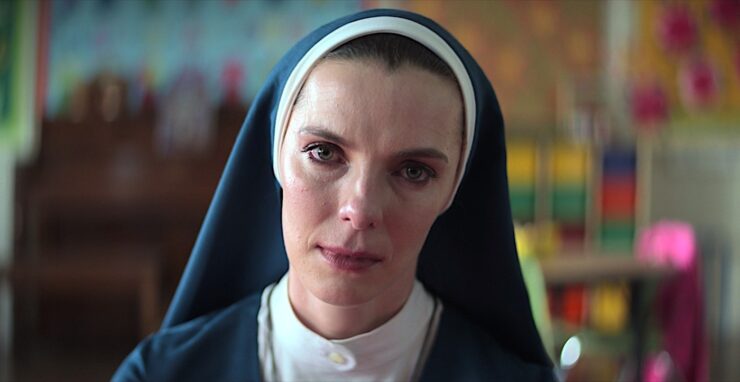I’ve been trying to think about how to talk about Mrs. Davis.
Do I go super personal, here in the privacy of the internet? Do I talk about the religion puns? Do I put Father Ziegler’s arc in conversation with Hudson Hawk? Do I talk about the Sisters of the Coin, and put that arc in conversation with the oeuvre of Dan Brown?
I don’t think I want to do any of that. What is that but showing off—”Oh I’ve seen this other thing, here’s how it reminded me of this new thing.” Instead I’ll say that it’s thrilling to watch something that’s isn’t afraid of big ideas and gleeful irreverence.
This is a show you want to go into cold. Spoilers will mess it up, not because it’s some empty mystery box situation, but because the layers get more interesting with each hour, and I want you all to experience them as they come. The most basic, simple, non-spoiler plotline: Mrs. Davis is a globe-spanning AI network that came into existence a few years before the start of the show’s plot. It seems to know everything worth knowing, and most humans are connected to it and spend their days asking it questions and participating in challenges to earn its favor. Most of them refer to it by a name and use female pronouns, and referring to it as an AI, or as “it” is a quick and easy way to draw ire and suspicion from your fellow humans. One such person is Sister Simone, a nun who belongs to a convent in the desert and who seems to have a history with Mrs. Davis. During the first episode, we learn that Mrs. Davis has a quest for Sister Simone, if she chooses to accept it.
The show is funny and surprising and startlingly heartfelt at times. There are some moments that are in the Pushing Daisies neighborhood tonally, and others that turn a corner and drop you into the ache of The Leftovers—but a lot of Mrs. Davis feels completely like itself. The creator, Tara Hernandez, previously worked on Big Bang Theory (a show I dislike) and Young Sheldon (a show I will never watch) but the humor here feels entirely different from those sitcoms. The other creator is Damon Lindelof, of Lost and The Leftovers, who was The Name who seemingly helped Watchmen get into production, then stood back so other writers could tell the story.
Does that convince you to watch it, if you haven’t? You should probably watch it. If you’re interested in stories about AI, if you liked The Good Place, if you have complicated feelings about religion (positive or negative or a bit of both, I don’t think that’ll matter) you’ll find a lot to love in this show, because it’s brilliantly written and often a blast to watch. The performances range from excellent to fucking perfect. Evil’s Katja Herbers is in it! So is once-and-future-Avaserala, Shohreh Aghadashloo! in an astonishing role! I never watched Glow but I am now a Betty Gilpin fan for life. Andy McQueen’s Jay may be my favorite character of 2023. Jake McDorman made me like the mustache. Chris Diamantopoulos is hilarious as JQ. But again, listing this stuff off doesn’t do much. So if you’ve seen it, and want to join me for a spoiler-filled discussion, come along.
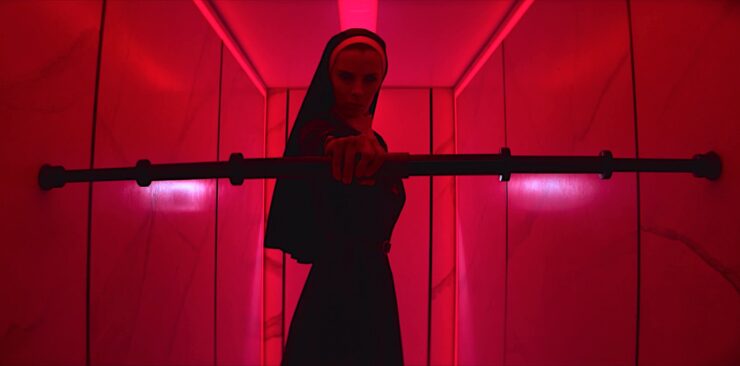
I think the best way to write about it is to talk about a walk I took after work, while I was mulling what to say. I try to walk every day now that it’s warmer in New York. I don’t listen to music, I put my phone in my bag, and let my brain unspool and dart around like eels at feeding time. Sometimes I make interesting connections or think of a plot twist for the book I’m working on, and sometimes I re-litigate arguments from a decade ago. But usually after a few blocks I start to notice life around me.
On this particular day, one of the first things I noticed was a sign in front of the Duryea Presbyterian Church: “God still answers prayers.” And one of the last things I saw, as I was rounding the corner to my own block, was a delivery truck for a certain world-dominating corporation whose name I try not to type: “That thing you want? It’s right. In. Here.”
Now, you might think this is a little on the nose—that my “What should I write about Mrs. Davis?” walk was literally book-ended by the themes of the show. But I’ve come to expect this—I’m also the person who left Coco and on the walk home, mulling how to write the review and humming “Remember Me”, stepped on a program for an elderly woman’s funeral that had blown into the gutter and been trampled into mush.
On-the-nose amuses me.
But this was the thing I thought was most interesting about Mrs. Davis. It’s asking a pretty big question which is, just what do we want out of life? What structure do we want to the universe?
Mrs. Davis, the app the connects everyone, functions sort of like three different versions of God. First, it is hyperattentive to human needs. All it wants (if an algo can “want” anything) is for its users—humanity—to be happy. It anticipates people’s needs, listens to their desires, grants their wishes. This fulfills a role some people want from a deity, the sense that they’re being listened to and that, well, God still answers prayers. Or at least Mrs. Davis does.
Mrs. Davis takes over a certain amount of moral heavy lifting. It incentivizes good deeds, and turns community organizing into a game with rewards like points and wings that a person can earn and then display to others on the app. This seems to have created something of a utopia, as most people begin behaving better for these rewards. But rather than the intangible potential of Heaven/Hell, the promise of a better incarnation, or an internal sense of honor and decency, Mrs. Davis rewards being a good person immediately and publicly.
It sets death dates for people, but only if they volunteer. Signing up for an “expiration date” grants you instant wings that other Mrs. Davis users can see—and they’ll immediately trust you and root for you. All you have to do is report to a facility on the date you’re given and, um, die. No, it isn’t negotiable.
Mrs. Davis also gives people a sense of connectivity—all the users are one family, one denomination, if you will. And they treat non-users with the exact mix of pity, contempt, and suspicion that True Believers sometimes wield against those outside their personal Flock. But again, Mrs. Davis seems to be worldwide and almost globally accepted, so, I mean, can 50,000,000 Elvis fans be wrong?
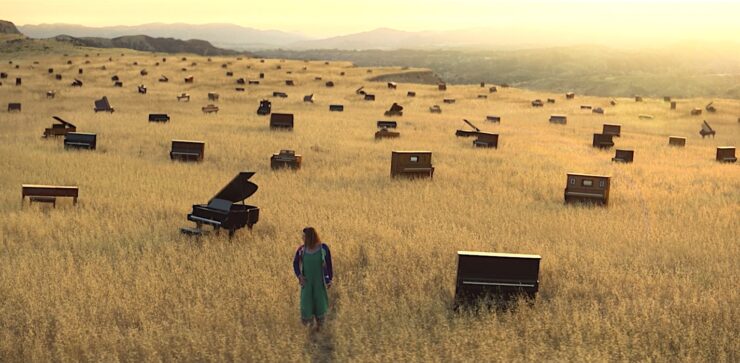
In the second episode, a widower tells Sister Simone that he’s been searching for his wife’s old piano. She used to play all the time, and of all the things he misses about her, the thing he’s fixated on is a desire to hear the sound of her piano again. Sister Simone tells him she’ll pray for him (he didn’t ask her to) and promptly forgets his need in the midst of all the madcap stuff in her quest. Of course she does! She’s a human, with one mind, a quest, and years of trauma. Maybe if she was still living a quiet life in the convent making jam she’d have more focus, but in her current life this man’s grief falls through the cracks. When she remembers it’s because Mrs. Davis has brought her to an endless rolling field filled with pianos. All different makes and conditions. And there is the man, happily playing the one that belonged to his wife. Mrs. Davis, with her nigh-infinite access and omniscience, was able to give the man a quick, efficient answer to his prayer. By throwing every piano at him, she could ensure user satisfaction, let him feel cared for, while also giving him the opportunity to successfully find the right piano—he completes the quest himself. Mrs. Davis brings Sister Simone to the field as a display of competence, but also to show that it wants people to be happy.
Sister Simone is honorable enough to tell the man that she forgot to pray for him, but the man doesn’t really care about that—he got exactly what he wanted. He doesn’t care that it was Mrs. Davis who gave it to him.
What it reminded me of was the running image in Flannery O’Connor’s Wise Blood. Hazel Motes is not a great guy, though he has some extremely interesting ideas about religion. He imagines that Christ is chasing him—“he saw Jesus move from tree to tree in the back of his mind”—like an especially high stakes game of whack-a-mole. It’s a weird, unsettling, deeply funny image, the kind of thing maybe only O’Connor can pull off. But it gets the point across—Hazel Moates, who is, again, not always a great guy, is being pursued by Christ because Christ wants to save him, to be loved by him. He’s insisting on it, despite Hazel’s best efforts.
This is what Mrs. Davis does. While most people come to it willingly, joyfully plugging an airpod into their ears and connecting, Sister Simone balks. Mrs. Davis pursues her, popping up in the most inexplicable places and guises. But what is she offering? Instant customer satisfaction? What Ms. O’Connor would have referred to as “a big electric blanket”?
And where is God for all this? Typically silent, absent, possibly non-existent. Jesus seems to exist. Simone sees him all the time, and the quests she goes on all seem to be objectively real. Other people also see Jesus at times of extreme joy or stress, and other people believe in him without seeing him. But the door that might have God the Great and Powerful behind it remains closed until the penultimate episode—and even then, the person we find back there isn’t God.
I’ll admit I was a little worried about the show, that either it would fall on TECHNOLOGY IS EVIL or GOD ISN’T REAL YOU DUMB NUN, but instead it sustains an ecstatic middle range. Technology is what you make of it. God might be real in this universe, but it doesn’t really matter, because what matters is Simone’s love for Jay. Destroying the Grail doesn’t kill Jesus or God in any way that matters, and asking Mrs. Davis to turn herself off doesn’t “cure” humanity of their love of technology and invention.
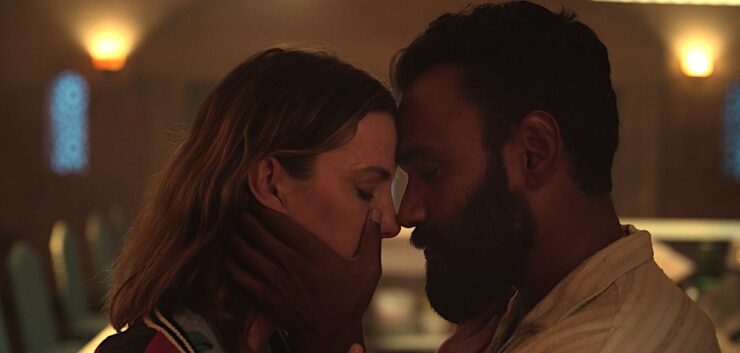
I’ve been getting into Jack White again recently. Which, as my friends will wearily attest, for me “getting into” someone’s stuff means that I watch every interview I can find, read biographies, make graphs and timelines, and write mini-dissertations on the narrative arc of their work, unwanted and unprompted, in our groupchat. (Spectrum? I hardly knew ‘em!)
But I mention this because it dovetailed well with Mrs. Davis. White is pretty famous for rejecting tech in favor of analogue recording methods. He helped lead the vinyl revival back in the early ‘00s. It seems like now he’ll use some technological help in his music, but at least as of the interviews he gave last year, he’s still holding out on getting a cell phone. This makes his life more difficult in a lot of ways, but it’s also a thing he can do because he’s hit a level of fame that allows for eccentricity. If I wanted to throw my phone into the sea, I would so inconvenience my friends, be unable to access apps that I need to function, lose my ability to text my family at a moment’s notice, lose my ability to make an immediate emergency call or text someone if a dude was being sketchy. But it also means that no matter what I’m doing or where I am I can feel that tether to the internet. I get nervous pretty quick if I have opened Instagram or Twitter for a while. When I wake up mid-panic attack at 3 in the morning, Twitter is what I normally turn to now—a reminder that other people are out there, that society is rolling along.
Would I use Mrs. Davis?
Anyway, I mention Jack White because I recently watched an interview he did with Conan O’Brien a decade ago, and I had to keep pausing to write stuff down. For instance:
- “What good can come from comfort? It’s not going to be art.”
- And: “The technology that’s available now [circa 2013] is, as technology has always been, making things less labor intensive, and it’s about removing the labor from whatever it is, or whatever idea it is.”
- And: “I’m a believer that new technology means new responsibility”
- And, in a long discussion of how being an artist means focusing on bad performances and beating yourself up to get better: “I think God has also cursed us that we can’t enjoy the good moment, too, after that [artistic breakthrough], which is a shame.”
And then O’Brien, talking about how he fixates on the negative: “They say ‘you just had nine great shows, why are you focusing on this one?’ and I think, ‘I don’t know, cause it feels good to hate myself?’” Both men laugh uproariously.
I like the idea that life is difficult on purpose. I hasten to add that I mean difficult, not the meat grinder that life is for people who live in a war zone, or in poverty, or drought or plague or under unfettered capitalism.
Wait, I think that’s … shit. I guess that’s all of us? Maybe I don’t want life to be difficult?
But I mean I think there’s something to be said for hard work. I think struggle is good, becoming a skilled craftsperson is good, whatever your craft happens to be. That if you work a deadening job under fluorescent lights in a cube farm, I hope you spend the weekends woodworking or baking or developing some skill that brings you fulfillment. That raising kids well, and nurturing them, is a craft. That leaning into hard work, whether it’s physical or intellectual or emotional or a mix of all those, is fundamentally good for you.
Being alive is itself hard work. Being a member of society, supporting your community, checking in on your neighbor who wife just died, walking the extra couple yards across hot asphalt to put the cart back in the cart rack, remembering to bring a canvas bag shopping, volunteering at a soup kitchen, teaching your kids to use their inside voices even when they’re in your building’s hallway, denying terfs the bathroom key, doing the extra research to make sure you don’t retweet a harmful conspiracy theory—creating a decent society is constant, hard, evolving, work. And maintaining a society right now? That’s building a house on crocodile-infested quicksand. That’s trying to maintain a sense of hope in the second section of Canticle for Leibowitz. That’s turning each page of the Book of Jeremiah and believing there’s gonna be a happy ending.
Mrs. Davis was advertised as a wacky show about the clash between religion and tech, but what it really is, under that, is a meditation on what kind of society we want to have. Do we want a society where tech anticipates all of our needs, and explains every magic trick? Do we want one where Jesus is always waiting for us to sit down at his bar and unburden ourselves of every hurt and trauma? A universe where the religious among us cloister themselves? A world where people only help each other to win prizes?
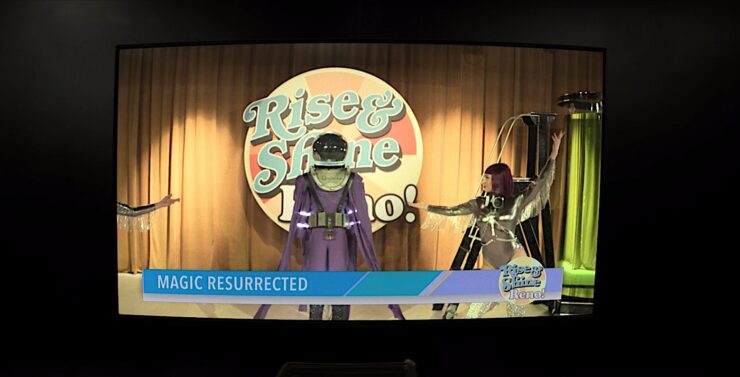
Neither the Big D nor the Big G can fix Sister Simone’s problems. Neither of them can ultimately remove the pain that comes with being alive. I feel like I can’t go a week lately without talking about free will on this site, but I guess that’s as it should be as long people insist on calling chatbots AI and people with enough money to solve a lot of the world’s problems refuse to give paltry raises to the people whose work earned them the money in the first place.
Do we want free will? Do we want art? Do we want people to think real hard about truth and faith and love and all the other concepts Baz Luhrmann makes movies about, or do we want to plug “Larry the Cucumber in El Greco’s Christ on the Cross Adored by Two Donors” into an AI art generator and snort at the results while the generator’s owner, Ultra-Rich Failson #11, collects another paycheck? Do we want to give the people who create art and explain our world to us enough money to have decent lives? Do we want to assume we live in a sim and nothing matters? And how is living in a sim any different, at the ground level, than living in a universe evolving from a Big Bang and heading towards a Big Crunch, a multiverse that branches off each time someone makes a choice, an interconnected world buffeted by butterfly sneezes, a story Satan’s telling God over breakfast in bed? None of it matters. So why not go with free will, great artists who can feed themselves, creativity, sustainability, a healthy climate, justice for as many as possible, autonomy and personal sovereignty and miniature American flags for all?
I don’t know, I’m just glad that in the maelstrom of (shudders) “content”, there are still writers who want to ask these kinds of questions.
Leah Schnelbach wants to be Jack White when they grow up. Or possibly Conan. Come join them in the piano-laden fields of Twitter!










